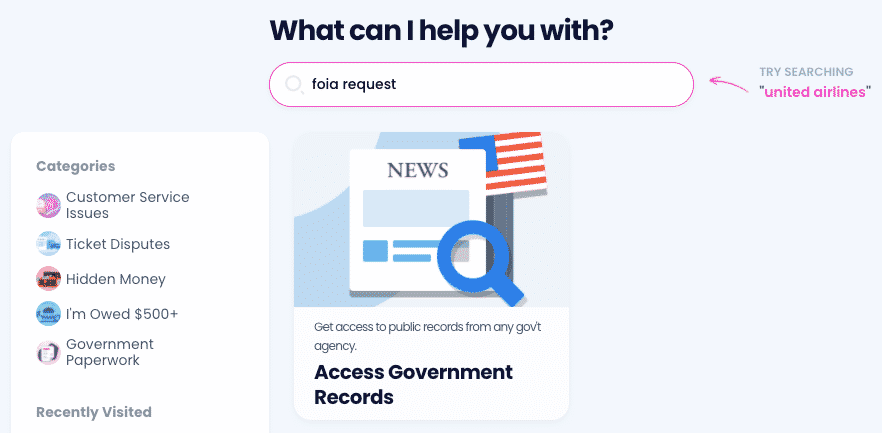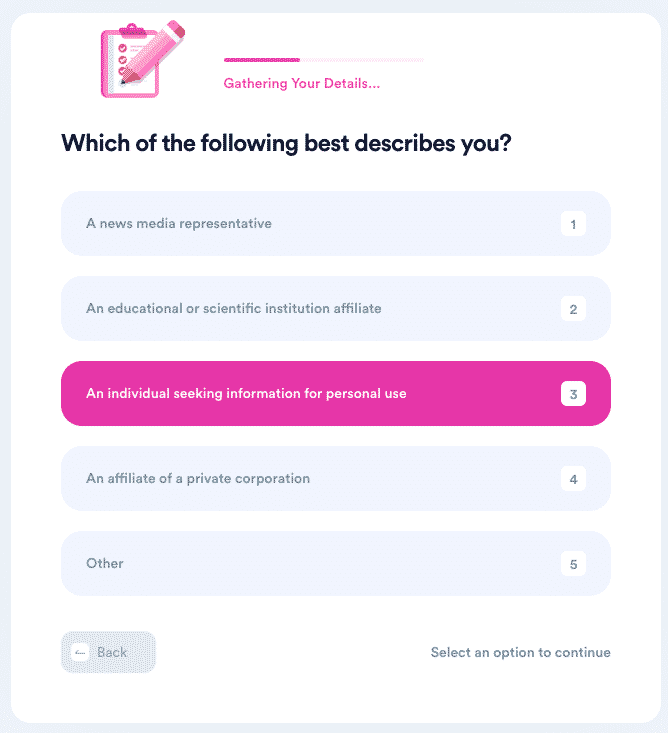Ohio Freedom of Information Act in a Nutshell
According to the Ohio Public Records Act of 1963, all citizens can demand access to the public office and government-related information. Similar to the federal Freedom of Information Act (FOIA) of 1966, it helps people keep up with the government’s actions.
If you wish to access public information under the Ohio Freedom of Information Act laws, DoNotPay is the right solution for you. Our guide will provide insight into the meaning of FOIA requests and teach you how to submit them with no sweat.
Thanks to our platform, you can get valuable tips for:
- Filing FOIA requests by phone, email, or online forms
- Getting familiar with FOIA templates and request forms
- Finding public records on yourself or your close people
- Checking the status of your request and filing an appeal for denied petitions
Who Can Demand Public Records Under the Ohio FOIA?
Ohio FOIA laws are more flexible than similar acts in other states. The state allows any person to request public information—you don’t need to be from Ohio or even from the USA. Citizens can submit their FOIA requests anonymously without specifying the purpose of their petition.
Some requester groups may gain modified access, which means that they may have certain limitations. The list of such groups includes:
- Journalists
- Prison inmates
- Commercial requesters
Are There Any Exemptions to the Ohio FOIA?
Like most FOIA laws across the USA, the Ohio Public Records Act has its exemptions. The term “exemptions” refers to the public information that isn’t subject to disclosure for privacy or security reasons.
The agency will deny your request if you demand the following types of records:
- Mediation
- Lethal injection
- Death of a minor
- Inmate records
- Medical records
- Trial preparation
- Military discharges
- Donor profile records
- Adoption proceedings
- Hospital trade secrets
- Child fatality review board
- Intellectual property reports
- Department of Youth Services
- Juvenile abortion proceedings
- Recreational activities of minors
- Law enforcement investigatory records
- Probation, parole, or post-release control, etc.
How Do the Officials Process Your Ohio FOIA Request?
The following table shows all the steps the officials need to go through while processing your request:
| Procedure | Explanation |
|
Receiving a request | The first step is to read and understand the request that arrived. It includes revising the case and determining the exact type of records you want to access |
|
Locating the records | After the officials identify the type of information you need, it’s time to find it. The searching procedure can be time-consuming—it may take more than a few weeks if the case is complicated |
|
Examining the records | Once they find what you need, the next step is to inspect the materials closely. This phase is the perfect time for reviews and redactions if needed. If the officials make any redactions, they need to provide a written explanation for their actions |
|
Preparing the records | The information you requested is ready—all that remains is to make the desired type of copies if necessary. If not, the officials will provide you with the requested records right away |
|
Delivering the records | When the copies are ready, the agency will contact you to specify the delivery method and send them as soon as possible |
If the officials inspect the matter and realize you are requesting the inaccessible records, they have to:
- Notify you that your request was unsuccessful
- Specify the reason for such a decision
- Provide the appeal instructions
Ohio Freedom of Information Act Request Fees
No institution will charge you for only inspecting the chosen records, but you will need to pay for both physical and electronic copies. Paper copies cost $0.05 per page, while a CD copy of your records requires a $1 fee. Postage and delivery costs may apply if the institution sends the copies to your address of residence.
The most affordable option is to have your records sent to your email address, as it’s free of charge.
How Can DoNotPay Help You Create a Rock-Solid FOIA Request?
Tiresome bureaucratic tasks are the main reason why people give up on their requests. Dealing with loads of paperwork and endless waiting is the last situation you want to go through when you need the information urgently.

Fortunately, DoNotPay has found a way to make the request procedure easier and more efficient! Thanks to , you can submit your petition fast and get the necessary public record sooner. The secret lies in our AI-powered service that generates a request letter on your behalf in less than five minutes.

To demand the desired public records with our help, follow the instructions below:
- Visit DoNotPay in your preferred
- Find the FOIA feature using the main keywords, such as FOIA, public records, etc.
- Indicate whether you want the records from the state or federal institution
- Provide the chatbot with the name of the agency and explain what records you need
- Choose whether you want to apply additional services, such as fee waivers, or expedite the process
Once you provide us with all the necessary details, we will create a request and mail it to the agency in question.
You can use our platform to request any type of available public records, including police and military public information.
Let DoNotPay Request Any Public Records in Your Stead
We have the most comprehensive database of all state and federal public records laws. It allows us to help you with demanding all types of accessible public information from any agency, including:
- State Department
- Internal Revenue Service (IRS)
- Central Intelligence Agency (CIA)
- U.S. Department of Defense (DOD)
- Federal Aviation Administration (FAA)
- Environmental Protection Agency (EPA)
- U.S. Customs and Border Protection (CBP)
- Executive Office for Immigration Review (EOIR)
- U.S. Securities and Exchange Commission (SEC)
- U.S. Immigration and Customs Enforcement (ICE)
If you need information from another state, consult our guides to accessing the desired public information in Illinois, Arkansas, California, Pennsylvania, South Carolina, etc.
Our AI Consumer Champion Gets Rid of All Admin Tasks
What makes DoNotPay so unique is that it helps you get back what is rightfully yours in many different ways. You can appeal parking tickets, find unclaimed money, demand a refund for canceled or delayed flights, get help with bills you cannot pay, or get your college application fees waived with the help of our platform.
If you’re sick and tired of annoying robocalls, spam emails, copyright violations, text message spam, or stalkers and harassers, DoNotPay can assist you in getting rid of them once and for all.
DoNotPay Can Help You Save Money
Have you ever subscribed to a service’s free trial you forgot about after a few days? Many Americans have, which is why DoNotPay has a free trial feature that will help you avoid getting charged once the trial is over.
If you want us to scan all your active memberships and help you not pay for the ones you don’t use, connect your email address or credit card to DoNotPay. Our cancel feature will ensure that you don’t waste your money on subscriptions you don’t even remember exist.
If a merchant charges you once the free trial is over, though, you can use our AI Consumer Champion to request a refund and skip the phone queue when doing so.
In case a company refuses to grant you a refund, you can also use our app to send demand letters to them in small claims court.


